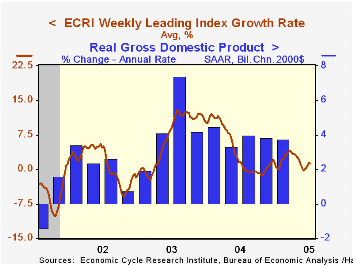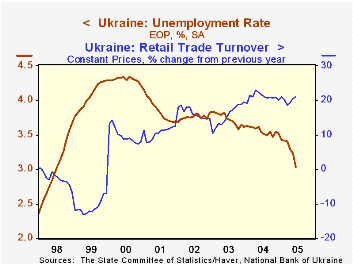 Global| Jul 18 2005
Global| Jul 18 2005ECRI Leading Economic Index Improved Slightly
by:Tom Moeller
|in:Economy in Brief
Summary
Though the level of the leading index of the US economy published by the Economic Cycle Research Institute (ECRI) fell in the latest week, the 0.7% decline was not enough to undo the modest improvement in the leaders since late May. [...]

Though the level of the leading index of the US economy published by the Economic Cycle Research Institute (ECRI) fell in the latest week, the 0.7% decline was not enough to undo the modest improvement in the leaders since late May. Since then index's six month growth rate has risen to 1.2% from -0.3%.
During the last ten years there has been a 54% correlation between the change in the weekly leading index and the change in US real GDP growth during the following quarter. The correlation has risen to 67% during the last five years.
While growth in the leaders is down sharply from double digit rates logged during 2003, recession is not indicated. Negative growth in excess of -4% typically preceded past U.S. recessions.
Moreover, slower economic growth may not even be indicated by the more than 10 percentage point drop in the leaders' growth. During both the late 1980s and the late 1990s the leaders slowed by an even greater degree and little slowing in real GDP occurred.
Visit the Economic Cycle Research Institute for analysis of US and international business cycles.
| Economic Cycle Research Institute | 07/08/05 | 12/31/04 | Y/Y | 2004 | 2003 | 2002 |
|---|---|---|---|---|---|---|
| Weekly Leading Index | 133.5 | 132.4 | 1.6% | 132.6 | 124.9 | 119.8 |
| 6 Month Growth Rate | 1.2% | 1.4% | 4.2% | 6.7% | 1.1% |
by Carol Stone July 18, 2005

The Ukrainian economy seems still trying to find its footing. Data reported today by the National Bank indicate continuing good gains in retail trade and continuing improvement in unemployment. But previous information shows that inflation remains well in double digits and industrial sector growth has slowed markedly so far this year.
Retail trade turnover gained 21.1% in constant prices in June from a year ago, slightly faster than in May and about the same pace as prevailed during 2004. The unemployment rate looks attractive at just 3.0%. This is down 0.5% from a year ago and compares with a peak in June and August 2000 of 4.3%. Thus, some conditions in the economy are clearly showing good health.
At the same time, industrial production, which had expanded 15.8% and 12.5% in 2003 and 2004, respectively, is growing much more slowly this year. Through May, it was up just 6.2% from May 2004, with progressively diminishing year-on-year growth rates each month. But prices continue to rise rapidly. The June CPI is up 14.4% from a year ago; the acceleration began about the middle of last year, and we'd surmise that energy costs were a contributor. The inflationary tendency is indicated in money growth that runs in the upper 30% range over a year ago. Thus, while there is strong real growth in such as retail trade, the accompanying inflation clouds the economic atmosphere, along with persistent political uncertainties.
| Ukraine | June 2005 | May 2005 | Year Ago | 2004 | 2003 | 2002 |
|---|---|---|---|---|---|---|
| Retail Trade (yr/yr % change, constant prices) | 21.1 | 20.4 | 21.0* | 15.6* | 16.4* | |
| Unemployment Rate (%) | 3.03 | 3.22 | 3.54 | 3.56 | 3.73 | 3.76 |
Tom Moeller
AuthorMore in Author Profile »Prior to joining Haver Analytics in 2000, Mr. Moeller worked as the Economist at Chancellor Capital Management from 1985 to 1999. There, he developed comprehensive economic forecasts and interpreted economic data for equity and fixed income portfolio managers. Also at Chancellor, Mr. Moeller worked as an equity analyst and was responsible for researching and rating companies in the economically sensitive automobile and housing industries for investment in Chancellor’s equity portfolio. Prior to joining Chancellor, Mr. Moeller was an Economist at Citibank from 1979 to 1984. He also analyzed pricing behavior in the metals industry for the Council on Wage and Price Stability in Washington, D.C. In 1999, Mr. Moeller received the award for most accurate forecast from the Forecasters' Club of New York. From 1990 to 1992 he was President of the New York Association for Business Economists. Mr. Moeller earned an M.B.A. in Finance from Fordham University, where he graduated in 1987. He holds a Bachelor of Arts in Economics from George Washington University.






